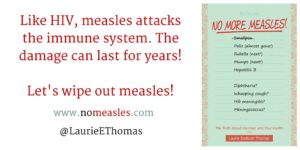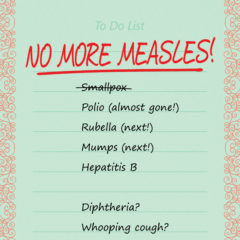 A measles virus infection starts off as a respiratory infection. Thus, it starts off looking and feeling like a common cold. But then it takes a dangerous turn: it infects the immune system. Measles can cause long-lasting damage to the immune system. Recent studies have shown that a case of measles can increase a child’s risk of death from other infections for more than 2 years!
A measles virus infection starts off as a respiratory infection. Thus, it starts off looking and feeling like a common cold. But then it takes a dangerous turn: it infects the immune system. Measles can cause long-lasting damage to the immune system. Recent studies have shown that a case of measles can increase a child’s risk of death from other infections for more than 2 years!
Measles is not the only viral infection that is known to produce long-term suppression of the immune system. Another example is the human immunodeficiency virus (HIV), which is the cause of acquired immunodeficiency syndrome (AIDS). However, HIV and the measles virus attack different kinds of white blood cells, which are the workhorses of the immune system.
HIV attacks the T4 lymphocytes, which are often called T‑helper cells. T‑helper cells help the other cells of the immune system recognize infections and tumor cells. After an HIV-infected person’s T4 cell count drops to dangerously low levels, his or her immune system is less able to fight many infections and some cancers (such as Kaposi’s sarcoma). Thus, the weakening of the immune system gives germs and cancer cells an opportunity to survive and thrive. The resulting diseases are called opportunistic.
People who are infected by HIV will remain infected for the rest of their lives. In contrast, most people who catch the measles will eliminate the measles virus from their body after only a few weeks. Yet the measles infection can cause long-lasting effects on the immune system because it wipes out the immune system’s memory. Measles virus kills the B memory cells, which are the white blood cells that are supposed to remember the germs that the body has successfully fought in the past. After the B memory cells are killed off, the immune system must relearn much of what it had already learned about dangerous germs. In the meantime, the person remains at risk for opportunistic infections.
HIV is bad, and so is measles. Having HIV and measles at the same time is particularly bad. The death rate from measles is particularly high in people who have any other form of immune suppression. Unfortunately, people who have a suppressed immune system cannot be vaccinated against measles, because the measles vaccine is a “live” vaccine. To protect those vulnerable people, we must ensure that practically everyone else is vaccinated against measles.
Most of the deaths due to measles are due to opportunistic infections. Thus, it is hardly surprising that the death rate from measles started to fall after the introduction of antibiotics, even though antibiotics have no effect on the measles virus itself. Yet even with the best of modern medical care, people still die of measles. Even if they survive, they may be left with permanent disabilities, such as blindness, deafness, and brain damage. In some cases, the measles virus infection may persist in the brain. This persistent infection leads to a horrible disease called subacute sclerosing panencephalitis (SSPE), which slowly destroys the brain. Thus, it leads to a slow and horrible death. There is no cure or even any effective treatment. Fortunately, SSPE can be prevented by preventing measles.
The vaccine against measles provides powerful, long-lasting protection. If you have received two doses of the measles vaccine, your chances of catching measles go down by about 97%. Thanks to the widespread use of the measles vaccine, measles was eliminated from the United States by the year 2000. Unfortunately, we still have occasional outbreaks of measles in the United States. Most of these cases can be traced to someone who was exposed to measles in some other country. So the best way to protect ourselves against measles is to drive the measles virus into extinction worldwide.
Unfortunately, many parents are refusing to allow their children to be vaccinated against measles. Many of these parents have been told that it is better to allow their children to get sick, so that they develop immunity naturally. In reality, many of the vaccine-preventable diseases are dangerous because they suppress the immune system. This immune suppression is good for the germ that causes the disease, but it is bad for the person who has the disease. As a result, having a vaccine-preventable infection can increase your risk of dying of some other infection.
Many parents are refusing vaccination because they think that the vaccines are unnecessary and unsafe. Conspiracy theorists claim that vaccines are being promoted simply to make money for the pharmaceutical companies. Yet if some sociopathic “pharma bro” really wanted to make money on vaccines, he would make sure that the vaccine-preventable diseases remain in circulation. Once a disease has been driven into extinction through vaccination, there is no longer any need to vaccinate anyone against it.
Smallpox is extinct. Today, nobody vaccinates children against smallpox. After polio is extinct, the sales of the polio vaccine will drop to zero. Like smallpox and polio, measles is caused by a virus that can be found only in human beings. Once we have wiped measles, mumps, and rubella off the face of the earth, nobody will need the MMR vaccine. But it would be madness to stop vaccinating against those diseases before then.
For information about efforts to eradicate measles, visit the Measles & Rubella Initiative.


